unit 4 workbook the story of an Eyewitness
文档属性
| 名称 | unit 4 workbook the story of an Eyewitness | 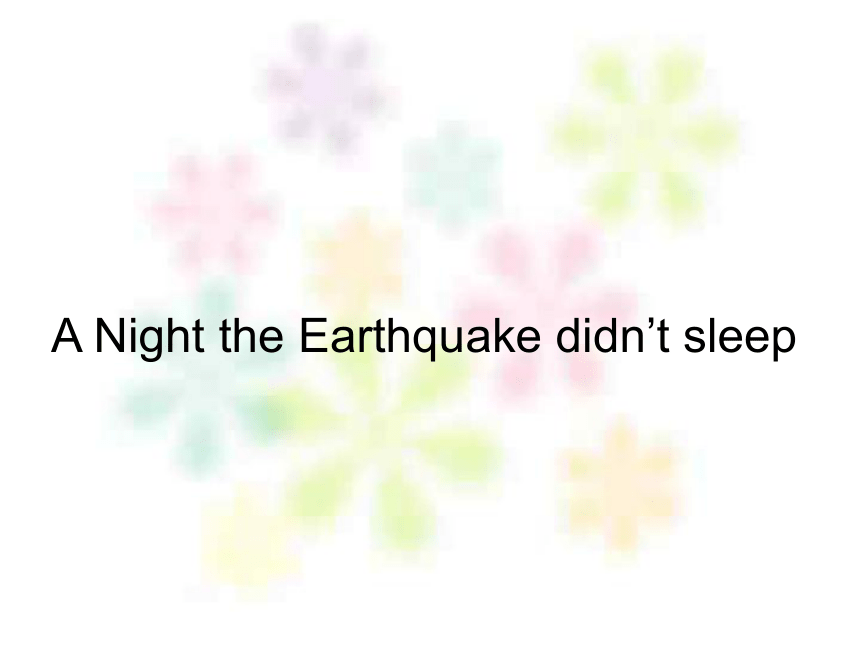 | |
| 格式 | rar | ||
| 文件大小 | 77.1KB | ||
| 资源类型 | 教案 | ||
| 版本资源 | 人教版(新课程标准) | ||
| 科目 | 英语 | ||
| 更新时间 | 2007-12-04 17:41:00 | ||
图片预览

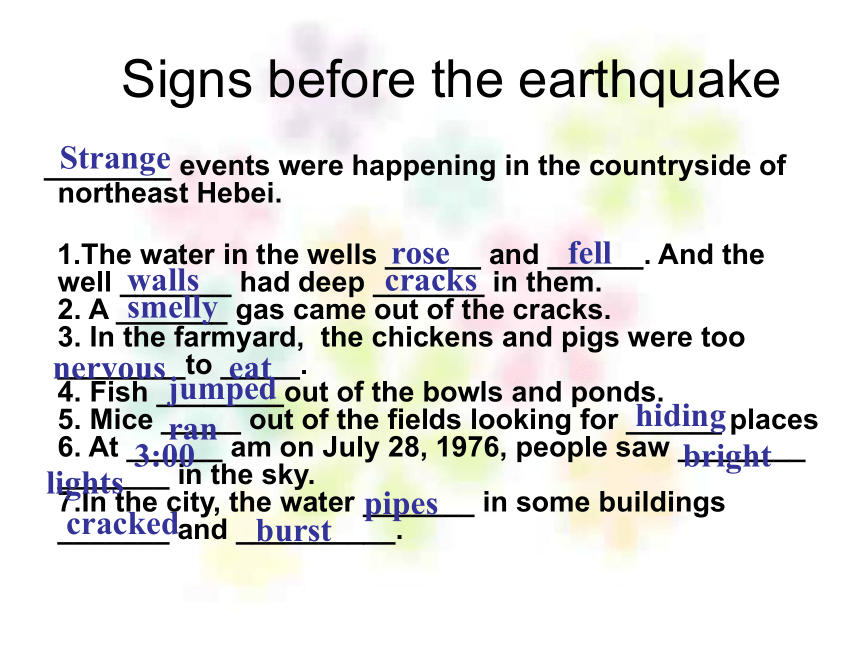
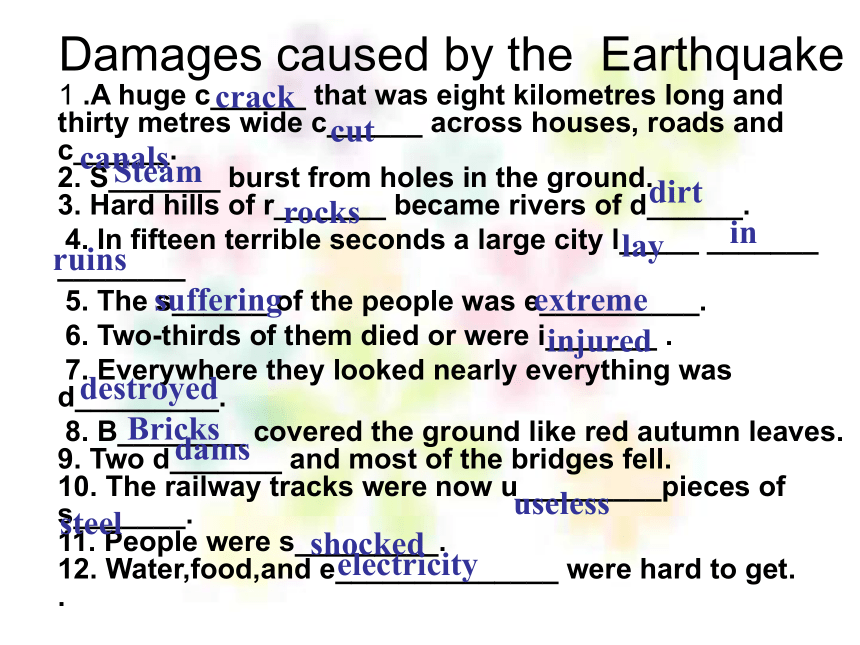
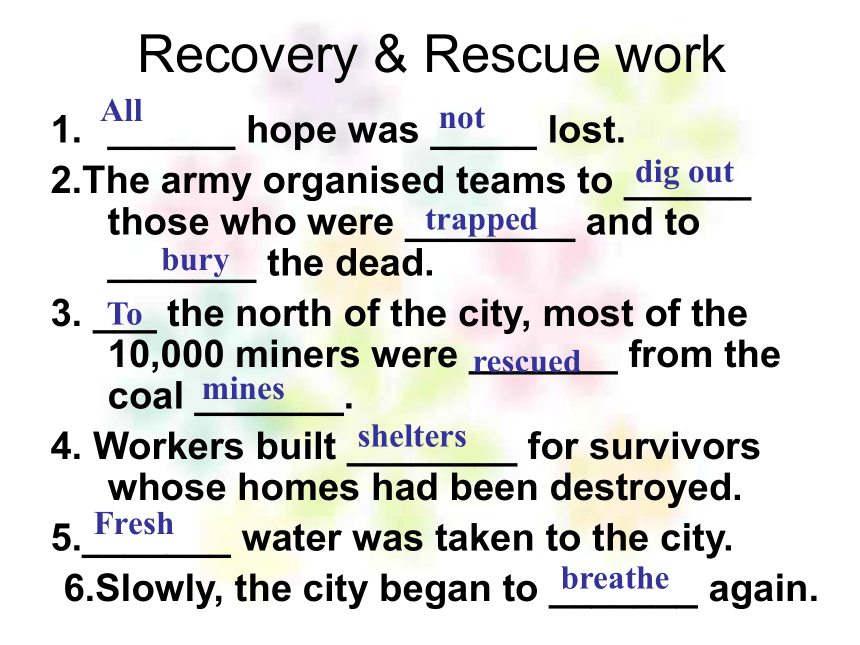
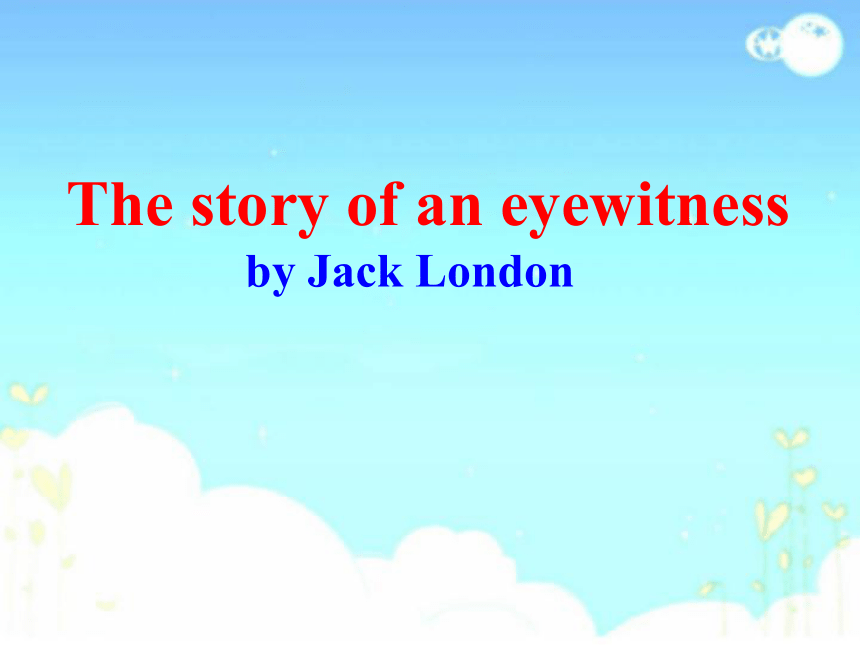
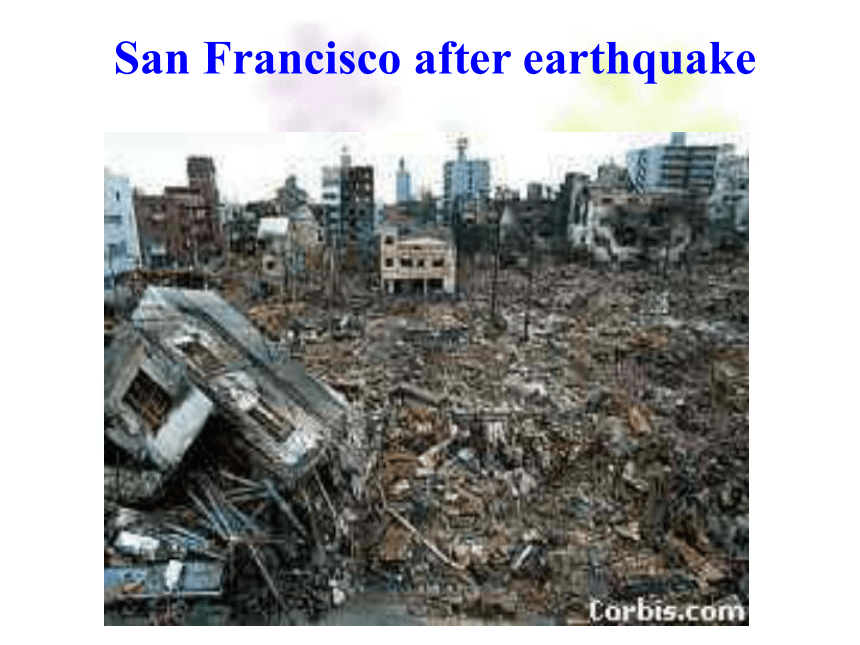
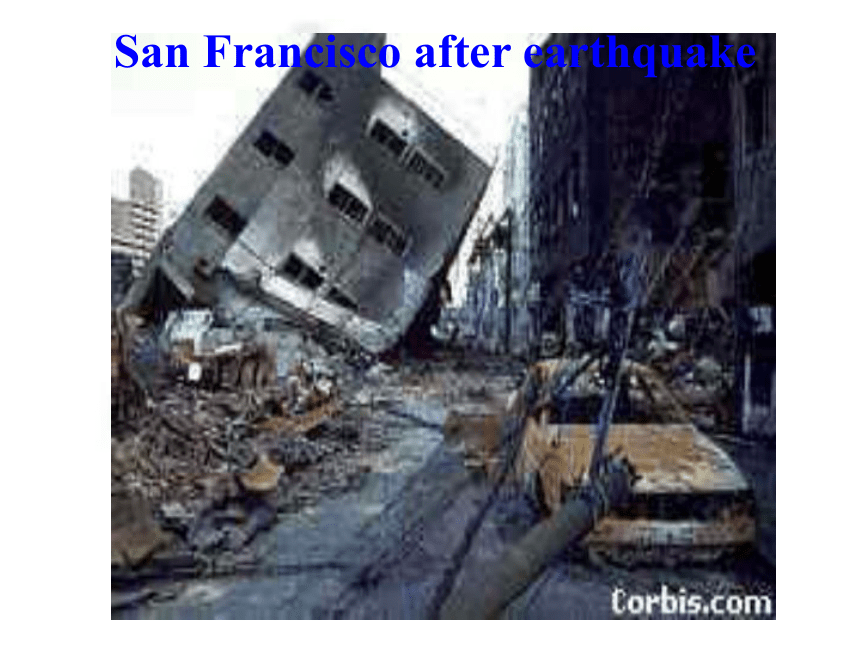
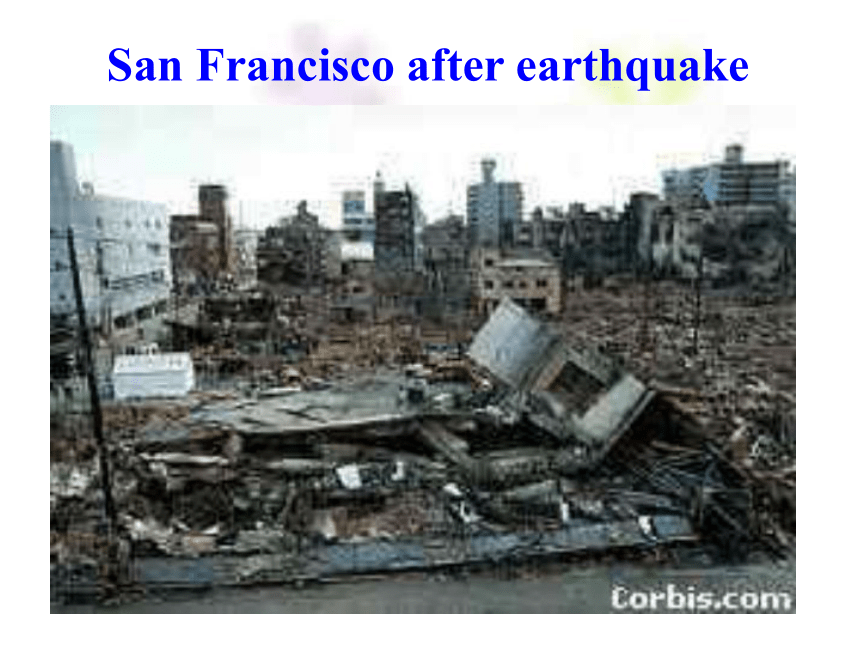
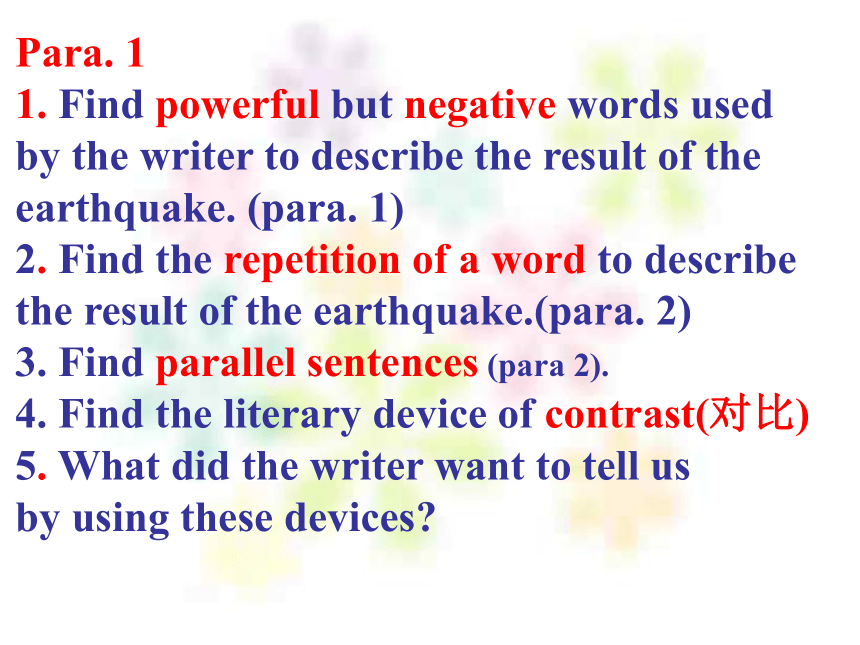
文档简介
课件25张PPT。A Night the Earthquake didn’t sleepSigns before the earthquake
________ events were happening in the countryside of northeast Hebei.
1.The water in the wells ______ and ______. And the well _______ had deep _______ in them. 2. A _______ gas came out of the cracks. 3. In the farmyard, the chickens and pigs were too ________to _____. 4. Fish ________out of the bowls and ponds. 5. Mice _____ out of the fields looking for ______ places 6. At ______ am on July 28, 1976, people saw ________ _______ in the sky. 7.In the city, the water _______ in some buildings _______ and __________.Strangerosefellwallscrackssmellynervouseatjumpedranhiding3:00brightlightspipescrackedburstDamages caused by the Earthquake 1 .A huge c______ that was eight kilometres long and thirty metres wide c______ across houses, roads and c______. 2. S_______ burst from holes in the ground. 3. Hard hills of r_______ became rivers of d______.
4. In fifteen terrible seconds a large city l_____ _______ ________
5. The s______ of the people was e__________.
6. Two-thirds of them died or were i_______ .
7. Everywhere they looked nearly everything was d_________.
8. B________ covered the ground like red autumn leaves. 9. Two d_______ and most of the bridges fell. 10. The railway tracks were now u_________pieces of s_______. 11. People were s_________. 12. Water,food,and e______________ were hard to get. . crackcutcanalsSteamrocksdirtlayinruinssufferingextremeinjureddestroyedBricksdamsuselesssteelshockedelectricity Recovery & Rescue work______ hope was _____ lost.
2.The army organised teams to ______ those who were ________ and to _______ the dead.
3. ___ the north of the city, most of the 10,000 miners were _______ from the coal _______.
4. Workers built ________ for survivors whose homes had been destroyed.
5._______ water was taken to the city.
6.Slowly, the city began to _______ again. Allnotdig outtrappedburyTorescuedminessheltersFreshbreatheThe story of an eyewitness
by Jack LondonSan Francisco after earthquakeSan Francisco after earthquakeSan Francisco after earthquakePara. 1
1. Find powerful but negative words used
by the writer to describe the result of the
earthquake. (para. 1)
2. Find the repetition of a word to describe
the result of the earthquake.(para. 2)
3. Find parallel sentences (para 2).
4. Find the literary device of contrast(对比)
5. What did the writer want to tell us
by using these devices?
Powerful but negative words are:
never and nothing
1. Never before in history has a city been
so completely destroyed.
A city has never before been so
completely destroyed in history.
2. Nothing is left of it but memories and
some houses far from the centre of the
city.
Nothing of the city but … and …
is left.The repetition of the word is gone
1. San Francisco is gone.
2. Its businesses are gone.
3. The factories, hotels and palaces are
gone too.
4. All of the ways man had made to keep
the city safe were gone in the 30
seconds the earth moved.Para. 2
Find parallel sentences in this paragraph
and try to explain the sentences using your
own words
1. A list of buildings undestroyed was now
only a few addresses.
2. A list of the brave men and women would
fill a library.
3. A list of all those killed will never be made.There were a great number of brave men and women during the earthquake.The number of the dead and their names will never be known.Only a few buildings were not destroyed.● How does the writer use contrast
(对比) to describe the scenes in the
earthquake?
The writer used the following contrast:
1. The disaster happened in the center of the city. Out in the sea, it was calm.
2. Later even the streets are strangely calm for a time. Amazing as it may seems, wednesday night was a quiet night.3. In all those terrible hours I saw not
one woman who cried, not one man was
excited.
4. Never in all San Francisco’s history
were her people so kind as on that
terrible night.
In all San Francisco’ history her
people were never so kind as on that
terrible night.2. What did the writer want to tell us
by using these literary devices?
The writer wanted to make it clear
that the earthquake had completely
destroyed the city of San Francisco,
which gives readers an impression (印象)
of entire hopelessness.
1.Write an adjective to describe how the author feels about the earth quake and what it did?_________.
Why did you choose this word? ShockedHe was surprised and frightened by what he saw.
1.Write an adjective to describe how the author feels about the people during the earthquake_________.
Why did you choose this word? sad/sorrowHe knew that many famlies lost their loved ones and all their possions.Let’s listen to the tape and practise reading the third paragraph with feeling.Ever since the San Francisco earthquake, all children in California have been taught what to do during an earthquake. Look at the pictures and discuss how to protect yourself if there was an earthquake.drop
cover
hold Write down three things to do to keep safe if there is an earthquake.1st thing I must do is
2nd thing I must do is
3rd thing I must do is To drop to the floor and cover my head and neck with my arms. To cover myself by hiding under some furnitureTo hold onto the furniture so it doesn’t move away from me during the earthquake.Write down the advice you hearIf you are outside, you should
If you are in the living room, you should
If you are in the house alone, you shouldGo to an open space away from buildings, trees or power linesTie the television to a table so that it won’t move and make sure that the bookcase are already tied to the wall.Ring a family friend to tell them where you are and collect your personal earthquake.1. make ruins of some of the city’s best
buildings
destroy some of the city’s best buildings
2. not be a danger to those in the street
not be dangerous to those people…
3. A list of …was now only a few
addresses.
Only a few buildings were not des-
troyed.
4. A list of …would fill a library.
The names of brave people would be
recorded in the history of the city.
5. A list of …will never be made.
There were too many people killed.
We will never know their names.
6. Amazing as it may seem,
Although it may seem amazing,
( surprising )Bye-bye
________ events were happening in the countryside of northeast Hebei.
1.The water in the wells ______ and ______. And the well _______ had deep _______ in them. 2. A _______ gas came out of the cracks. 3. In the farmyard, the chickens and pigs were too ________to _____. 4. Fish ________out of the bowls and ponds. 5. Mice _____ out of the fields looking for ______ places 6. At ______ am on July 28, 1976, people saw ________ _______ in the sky. 7.In the city, the water _______ in some buildings _______ and __________.Strangerosefellwallscrackssmellynervouseatjumpedranhiding3:00brightlightspipescrackedburstDamages caused by the Earthquake 1 .A huge c______ that was eight kilometres long and thirty metres wide c______ across houses, roads and c______. 2. S_______ burst from holes in the ground. 3. Hard hills of r_______ became rivers of d______.
4. In fifteen terrible seconds a large city l_____ _______ ________
5. The s______ of the people was e__________.
6. Two-thirds of them died or were i_______ .
7. Everywhere they looked nearly everything was d_________.
8. B________ covered the ground like red autumn leaves. 9. Two d_______ and most of the bridges fell. 10. The railway tracks were now u_________pieces of s_______. 11. People were s_________. 12. Water,food,and e______________ were hard to get. . crackcutcanalsSteamrocksdirtlayinruinssufferingextremeinjureddestroyedBricksdamsuselesssteelshockedelectricity Recovery & Rescue work______ hope was _____ lost.
2.The army organised teams to ______ those who were ________ and to _______ the dead.
3. ___ the north of the city, most of the 10,000 miners were _______ from the coal _______.
4. Workers built ________ for survivors whose homes had been destroyed.
5._______ water was taken to the city.
6.Slowly, the city began to _______ again. Allnotdig outtrappedburyTorescuedminessheltersFreshbreatheThe story of an eyewitness
by Jack LondonSan Francisco after earthquakeSan Francisco after earthquakeSan Francisco after earthquakePara. 1
1. Find powerful but negative words used
by the writer to describe the result of the
earthquake. (para. 1)
2. Find the repetition of a word to describe
the result of the earthquake.(para. 2)
3. Find parallel sentences (para 2).
4. Find the literary device of contrast(对比)
5. What did the writer want to tell us
by using these devices?
Powerful but negative words are:
never and nothing
1. Never before in history has a city been
so completely destroyed.
A city has never before been so
completely destroyed in history.
2. Nothing is left of it but memories and
some houses far from the centre of the
city.
Nothing of the city but … and …
is left.The repetition of the word is gone
1. San Francisco is gone.
2. Its businesses are gone.
3. The factories, hotels and palaces are
gone too.
4. All of the ways man had made to keep
the city safe were gone in the 30
seconds the earth moved.Para. 2
Find parallel sentences in this paragraph
and try to explain the sentences using your
own words
1. A list of buildings undestroyed was now
only a few addresses.
2. A list of the brave men and women would
fill a library.
3. A list of all those killed will never be made.There were a great number of brave men and women during the earthquake.The number of the dead and their names will never be known.Only a few buildings were not destroyed.● How does the writer use contrast
(对比) to describe the scenes in the
earthquake?
The writer used the following contrast:
1. The disaster happened in the center of the city. Out in the sea, it was calm.
2. Later even the streets are strangely calm for a time. Amazing as it may seems, wednesday night was a quiet night.3. In all those terrible hours I saw not
one woman who cried, not one man was
excited.
4. Never in all San Francisco’s history
were her people so kind as on that
terrible night.
In all San Francisco’ history her
people were never so kind as on that
terrible night.2. What did the writer want to tell us
by using these literary devices?
The writer wanted to make it clear
that the earthquake had completely
destroyed the city of San Francisco,
which gives readers an impression (印象)
of entire hopelessness.
1.Write an adjective to describe how the author feels about the earth quake and what it did?_________.
Why did you choose this word? ShockedHe was surprised and frightened by what he saw.
1.Write an adjective to describe how the author feels about the people during the earthquake_________.
Why did you choose this word? sad/sorrowHe knew that many famlies lost their loved ones and all their possions.Let’s listen to the tape and practise reading the third paragraph with feeling.Ever since the San Francisco earthquake, all children in California have been taught what to do during an earthquake. Look at the pictures and discuss how to protect yourself if there was an earthquake.drop
cover
hold Write down three things to do to keep safe if there is an earthquake.1st thing I must do is
2nd thing I must do is
3rd thing I must do is To drop to the floor and cover my head and neck with my arms. To cover myself by hiding under some furnitureTo hold onto the furniture so it doesn’t move away from me during the earthquake.Write down the advice you hearIf you are outside, you should
If you are in the living room, you should
If you are in the house alone, you shouldGo to an open space away from buildings, trees or power linesTie the television to a table so that it won’t move and make sure that the bookcase are already tied to the wall.Ring a family friend to tell them where you are and collect your personal earthquake.1. make ruins of some of the city’s best
buildings
destroy some of the city’s best buildings
2. not be a danger to those in the street
not be dangerous to those people…
3. A list of …was now only a few
addresses.
Only a few buildings were not des-
troyed.
4. A list of …would fill a library.
The names of brave people would be
recorded in the history of the city.
5. A list of …will never be made.
There were too many people killed.
We will never know their names.
6. Amazing as it may seem,
Although it may seem amazing,
( surprising )Bye-bye
